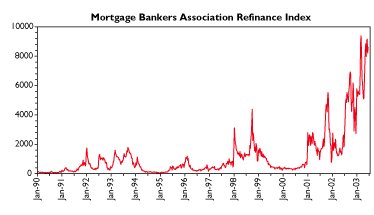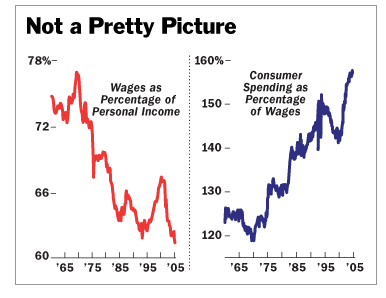

|
| weblog/wEssays archives | home | |
|
Financial Kryptonite in a "Super-Strength" Housing Market (June 6, 2006) What is financial Kryptonite to a "Super-Strength" housing market dependent on cheap money and lax lending? A tightening of rates--and borrowing standards. 
* * * * * * * * * * * * * * * * * * * * * * * * * * * * * * * How lax are current lending practices? I refer you to Louis Hill's Real Estate Tales Blog for an example of just how loose borrowing standards have become. According to Hill's first-hand report, a couple recently bought a condo in Las Vegas for $425,000 which had sold in 2005 for $300,000. So far so good--until you consider their borrowing:
 Can you say "speculation run amok"? Perhaps you wonder if Hill's informant stretched the numbers a bit
here and there; but the fact remains that according to the National Association of Realtors'
chief economist, "Forty percent of all home sales in 2005 were second homes - investment properties and
vacation homes - compared to about 9 percent 10 years ago." And according to a recent
piece in The Wall
Street Journal:
Can you say "speculation run amok"? Perhaps you wonder if Hill's informant stretched the numbers a bit
here and there; but the fact remains that according to the National Association of Realtors'
chief economist, "Forty percent of all home sales in 2005 were second homes - investment properties and
vacation homes - compared to about 9 percent 10 years ago." And according to a recent
piece in The Wall
Street Journal:
A full 29% of people who took out mortgages or refinanced in 2005 have no equity or negative equity in their homes, according to Christopher Cagan of First American Real Estate Solutions, a data provider. That's a shocking figure, compared with 10.6% of people who took out mortgages in 2004.  Do those facts strike you as signs of a healthy market? If so, few would agree with you:
Do those facts strike you as signs of a healthy market? If so, few would agree with you:
"This is the first cycle that you could actually instantaneously crystallize the rise in the notional price of a home and use it for current consumption," says David Rosenberg, chief North American economist for Merrill Lynch & Co.But two forces are stirring which appear to be curtailing the easy credit and the easy standards: Federal regulators and the global market for debt. Regulators are moving, albeit glacially, to inhibit at least some the most blatant speculative practices of lenders, as described in the WSJ piece, Housing Banks May Be Forced To Cut Dividends: A crackdown by regulators of the Federal Home Loan Banks threatens to shrink a subsidy long enjoyed by thousands of lenders, including giants such as Washington Mutual Inc. and Citigroup Inc. The home-loan banks' rapid expansion in recent years has been fueled by intense global demand for bonds issued by U.S. government-related entities. The home-loan banks' debt currently totals about $778 billion, making them significant competition in debt sales with the U.S. Treasury, which has $4.259 trillion of marketable debt outstanding.To summarize: housing lenders are playing speculative games with mortgages and mortgage-backed securities-- games which can generate hundreds of millions in losses in short order. Perhaps too little too late, regulators are awakening to the dangers of lax lending standards and mortgage-backed arbitrage bets. Just as regulators start tightening the screws, Foreign appetite for all this U.S. debt--including mortgage-backed securities--appears to finally be faltering. Stephen Roach of Morgan Stanley recently observed: From Beijing to Dubai, there is a growing undercurrent of economic anti-Americanism. The irony of it all is truly extraordinary: The US has the greatest external deficit in the history of the world, and is now sending increasingly negative signals to two of its most generous providers of foreign capital -- China and the Middle East. The United States has been extraordinarily lucky to finance its massive current account deficit on extremely attractive terms. If its lenders now start to push back, those terms could change quickly -- with adverse consequences for the dollar, real long-term US interest rates, and overly indebted American consumers. The slope is getting slipperier, and Washington could care less.If you want some statistics to back up Roach's sense, then check out the WSJ's piece bond rates rising: The most recent data from the U.S. Treasury hint at a drop in demand for U.S. bonds in favor of securities elsewhere: Foreigners increased their holdings of U.S. Treasury bonds by $4.4 billion in January, compared with an average monthly increase of $28.6 billion in 2005.That is a massive drop in buying. And we all know what happens to interest rates when no one ponies up to buy all those bonds and mortgage-backed securities: interest rates must rise. The global debt cycle which has enabled this massive real estate speculation drew this explanation, excerpted from an interview with economist Michael Hudson, who penned the recent Harper's article, "The New Road to Serfdom" (which I covered in an entry The New Road to Serfdom: A Negative-Equity Mortgage): If ever there was a Faustian proposal by the proverbial devil, this is it. And it is good to remember Baudelaire's quip about the devil: He achieves his victory over humanity at the point where people become convinced that he doesn't exist.Hudson calls this stupendous debt machine--built on the foreign-supported liquidity of the bond market and lax lending standards--the Devil; whatever the term you wish to employ, it does not bode well for the housing market or the fiscal health of the nation. For more on this subject and a wide array of other topics, please visit my weblog. copyright © 2006 Charles Hugh Smith. All rights reserved in all media. I would be honored if you linked this wEssay to your site, or printed a copy for your own use. |
||
| weblog/wEssays | home |